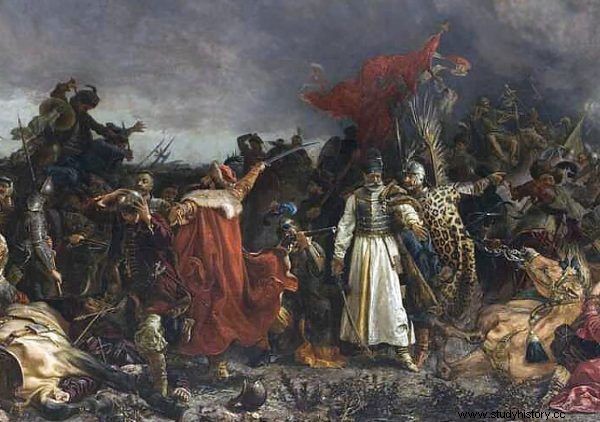Hetman Żółkiewski did a lot to avoid a war with Turkey. In 1620, however, the conflict intensified, and he was entrusted with the command of the Polish-Lithuanian forces. The expedition to Moldova ended tragically - although the defeat could have been avoided, had it not been for ... the mercy of the commander-in-chief.
Despite the efforts of Żółkiewski, who tried to inhibit the constant invasions of the Cossacks on the provinces subordinated to the Sultan, their attacks, as well as the help of the Habsburgs by Sigismund III and the sending of the Lisowczyk family against the forces of Bethlen Gabor, who besieged Vienna, finally led to a war with Turkey. The 73-year-old, ailing Grand Hetman was entrusted with leading the expedition to Moldova, preceding the Port attack. As it turned out, this was going to be his last trip.
On September 19, 1620, after crossing the Dniester, the Polish-Lithuanian forces led by Żółkiewski and Koniecpolski fought a battle with Iskander Pasha's troops at Cecora. The battle ended in the defeat of the Polish army, which led to the collapse of the fighting spirit, especially in the magnate units.
The Hetmans were unable to control the situation when the troops, incited by former Moldavian hospodar Gaspar Grazzini and Samuel Korecki, left the camp on the night of September 20-21, trying to cross the Prut. Many soldiers were killed; the rest returned to the camp. The conversation that took place then between the commander-in-chief and Korecki became almost legendary. The rebel allegedly accused Żółkiewski of causing a tumult. The Hetman replied that it was not water that ran from him…

Fragment of Witold Piwnicki's painting depicting the Battle of Cecora.
An experienced commander accepted the only possible solution in this situation. He began to slowly retreat in the train formation towards the borders of the Polish-Lithuanian Commonwealth. During the retreat, the attacks of the horde were repulsed every now and then. There was only a dozen or so kilometers to the Dniester when the tragedy happened. The hetman had his revenge on the fact that he did not immediately punish the playful domestics and Lisowczyk family who robbed the wagons during the first revolt.
The injured only received a promise from him that the guilty would be punished after crossing the border. As a result, on October 6, confusion broke out in the rolling stock. Czeladź, Cossacks and the post office, shouting that the hetmans were escaping, tore up the camp and began to flee towards the river.
The Hetmans failed to stop the escapees. One account says that in the face of defeat, Koniecpolski led Żółkiewski's horse, advising him to escape. The latter refused, and as a sign that he intended to remain among his soldiers to the end, he slashed the horse with his sword. Surrounded by Kantimir's commanders, he died like a hero. Iskander Pasha sent his severed head to the Sultan as a sign of victory, while the body of the commander's servants took him to Żółkiew, where they were buried. Meanwhile Koniecpolski, Jan and Łukasz Żółkiewski were captured.
Although the Grand Hetman did not avoid mistakes during his last campaign, he is not to blame for her defeat. It should be borne by the magnates taking part in this expedition, who contributed to the anarchy and confusion in the camp, if only by the fact that they often negated the orders given by Żółkiewski.
The heroic death of the hetman brought him to the national pantheon of great Poles who gave their lives to defend their homeland. Descriptions of the Cecors campaign, for example by Teofil Szemberg, recorded his impeccable image. Also in the well-known work by Stanisław Witkowski, entitled "The wake up of knightly people by the abolished Turkish navigability", the general grief of the noble brothers after the loss of the hetman who defended the borders of the Republic of Poland for almost half a century was shown:
Serving death in the old age of the Republic
He did not want to run away and save his life,
He preferred, for the fame of Poland, to give his health
And he gave it with sorrow for all Christianity-
And Poland is crying bloody hetman worthy.
Żółkiewski was avenged in the fields of Khotyn in 1621 and in battles with the Turks and Tatars led by his protégé, Stanisław Koniecpolski, and his relative, Jan Sobieski.
***
You can read about the secret of the successes of our greatest leaders in the book "Polish gods of war" . The above text is an excerpt from the chapter devoted to Stanisław Żółkiewski.
